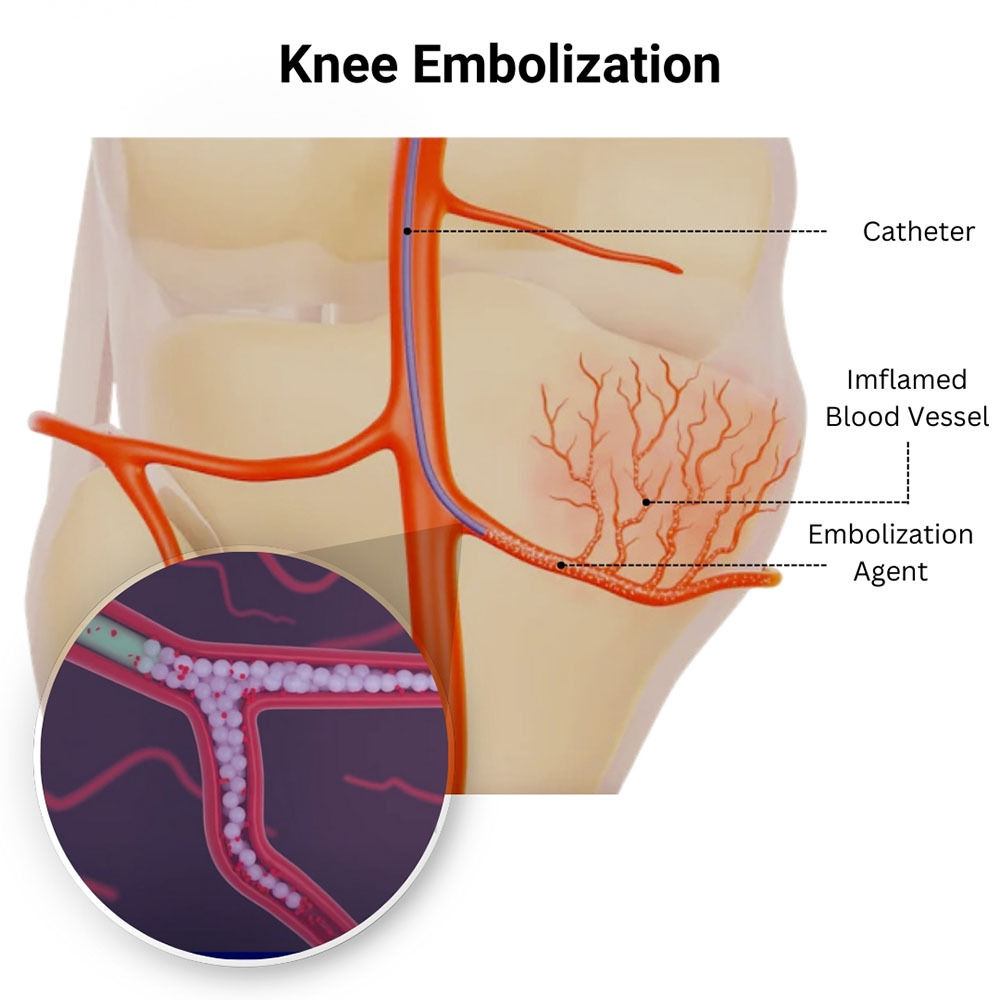
Knee arthritis can be severely painful and restrict your mobility without the proper treatment. If you get a knee replacement, you must go through the rigors of physical therapy and extended downtime. But if you visit a vein center in Brooklyn, you find a specialist who offers embolization for knee arthritis. The interventional radiologist at Astra Vein & Fibroid Treatment Center, Dr. George Bolotin, provides this minimally invasive technique at his Brooklyn vein center, in addition to embolization for other troubling conditions like hemorrhoids and fibroids. Call this established vein clinic in Brooklyn today to book a consultation.
Knee embolization, technically called genicular artery embolization, is a minimally invasive procedure that provides quick relief if you’re dealing with moderate to severe pain due to knee arthritis. Knee arthritis includes different types of arthritis such as osteoarthritis and rheumatoid arthritis, all of which lead to the breakdown of cartilage in your knee joint. This degradation results in inflammation, pain, stiffness and a reduced range of motion. Knee embolization blocks the blood vessels that supply painful areas of your knee joint.
At Astra Vein & Fibroid Treatment Center in Brooklyn, NY, a dedicated vascular specialist helps you regain your knee movement. Dr. George Bolotin is an interventional radiologist specializing in this embolization treatment.
He and his staff also offer a range of other vein treatments, including:

Your interventional radiologist discusses your symptoms and reviews your medical history before the procedure. They may order imaging tests such as an MRI or ultrasound to locate the areas of inflammation in your knee. On the day of the procedure, an IV line is placed in your arm to deliver any necessary medications and anesthesia.
After completing the embolization, your radiologist removes the catheter. You’ll then be taken to a recovery area to be monitored for a short time to ensure everything is stable and you’re comfortable. The procedure typically takes one to two hours, but plan to spend around four to six hours at the vein clinic in Brooklyn.
If you have chronic knee pain due to a degenerative condition like osteoarthritis, knee embolization could help.
Knee embolization might be right for you if you meet vital characteristics as determined by your vein doctor in Brooklyn, such as:
Research shows that 70 to 85 percent of people feel much better after knee embolization with their overall pain reduced by at least half. While knee embolization can be effective, it’s not suitable for everyone.
Your NYC doctor at the Brooklyn vein center might not suggest knee embolization if:
You might feel some soreness in your knee right after the procedure. This is usually mild and should fade within a few days. The procedure is safe when done by an experienced interventional radiologist like Dr. Bolotin.
However, some common side effects of knee embolization may include:
These usually pass quickly and can be managed with rest and fluids. Your interventional radiologist carefully maps your knee to avoid these risks.
Joint replacement surgery is more invasive compared to knee embolization, which involves removing damaged cartilage and bone from your knee joint and replacing them with artificial components. It requires a larger incision and is performed under general or regional anesthesia. You may need to spend several days in the hospital followed by rehabilitation and physical therapy to regain mobility and strength.
Your recovery time is generally shorter after knee embolization. You can resume light activities within a few days and are encouraged to gradually return to normal routines over a few weeks. Recovery from joint replacement surgery takes longer. You may have to rely on crutches or a walker and full recovery can take up to six months or longer depending on your overall health.
A board-certified varicose vein doctor in Brooklyn like Dr. Bolotin can help you manage knee pain effectively and improve mobility. Whether you’re curious about how to avoid knee replacement surgery or want to manage knee arthritis, the team that provides exceptional varicose vein treatment in Brooklyn can help. Contact Astra Vein & Fibroid Treatment Center today for a consultation.
Vein & Vascular Medical Care
4209 Ave U, Suite A.
Brooklyn, NY 11234
(347) 934-9068
Vein & Vascular Medical Care
869 E Tremont Ave
Bronx, NY 10460
(929) 447-4563